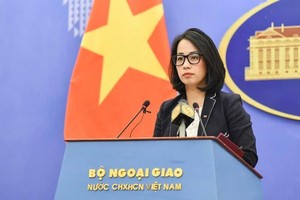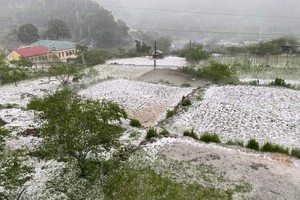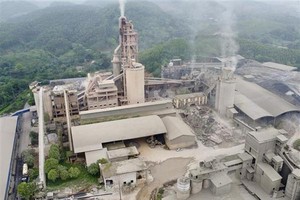The victory of the resistance war against the US was a triumph of military arts under the Party's sound and creative leadership, General Secretary of the Communist Party of Viet Nam (CPV) Nguyen Phu Trong said last Friday.

In an article to mark the 40th anniversary of Southern Liberation and National Reunification, Trong, who is also Secretary of the CPV's Central Military Commission, said the victory had huge international significance and profound historical power.
He described it as a great fruit reaped by Vietnamese people, demonstrating the outstanding power of their revolutionary heroism, virtue, and intellect under the late President Ho Chi Minh's leadership, he said.
Forty years ago, the general offensive in the spring of 1975—with the historic Ho Chi Minh Campaign as its pinnacle—ended successfully, leading to the ultimate victory of the resistance war against the US aggressors and the reunification of the country.
The resounding triumph created a turning point in national history, opening a new chapter of national independence and socialism.
According to the Party chief, between July 1954 and May 1975, the Party pursued independent and self-reliant political and military policies, holding the flag of national independence and socialism aloft.
It concurrently launched the people's democracy revolution in the South and the socialist revolution in the North, towards national independence, unification and socialism.
After the Paris Agreement was signed on January 27, 1973, and US troops pulled entirely out of Viet Nam's southern region on March 29, 1973, the battle changed significantly.
In 1974, attacks were launched over southern battlefields, guided by the Party's strategy of dismantling the enemy unit by unit. The general offensive in the spring of 1975 led to the ultimate victory.
Trong said that during the war, under the Party's leadership, Vietnamese military arts reached a peak.
The Party paid special heed to Party work and political affairs in the army, especially during campaigns. It rallied the people's power in terms of financial resources, political approval, strength and patriotism, he said.
He also praised the international community's immense spiritual and material support as a crucial element in the triumph.
"The Party, State, and army of Viet Nam have never forgotten the wholehearted assistance given by people from across the globe and fraternal socialist countries, especially the Soviet Union and China, to the just struggle of our nation," the Party Chief said, emphasising the solidarity of the Viet Nam-Laos-Cambodia alliance.
In his writing, the Party chief analysed regional and global situations and important achievements made by Viet Nam during its 30-year renovation process, as well as difficulties and challenges, especially in defending the country's island and sea sovereignty.
"The lesson learnt from the success of Party leadership in the resistance war against US aggressors should be inherited and promoted in this new period of development," he said.
He said the lesson was about persistently chasing national independence and consistently applying Marxism-Leninism and Ho Chi Minh's thought.
According to the Party leader, in order to increase the strength and health of the Party, the entire nation must continually implement the fourth Party Central Committee Resolution and continue learning and following the moral example of the late President Ho Chi Minh.
Efforts to prevent and combat corruption, waste and degradation in terms of political ideology, ethics, and lifestyle among Party members and State officials must also be re-inforced.
He said that the fight against hostile forces was essential to firmly maintaining the Party's leadership and the socialist regime.
Trong said the army needed to speed up its efforts to build a revolutionary, regular, elite and modern military. He added that it should also work closely with public security and foreign-affairs to consult the Party and State on policies and strategies to defend the homeland and create a peaceful and stable environment.
To that end, the Party's absolute and comprehensive leadership over the army should be intensified, Trong said, placing the focus on the political, ideological and organisational spheres of the CPV's Central Military Commission.
He also underlined the need to combat apolitical schemes by hostile forces targeting the army.
The 85-year history and development of the Party showed its firmness, intellect, virtue and sound leadership capability in difficult and complicated situations.
"We believe that the lessons from the success of the Party's leadership in the spring of 1975, as well as during the entire struggle against the US aggressors to liberate the country, will be promoted in the new era," the Party chief said
























